You ever had the feeling that you're in way over your head?
I joined Hive this week, and that's instantly how I felt. Well, not instantly. First I felt welcomed and supported and encouraged. So many nice people helped me get started.
At the same time, amongst all their awesomeness, my head still swam with new acronyms. HBD, HP, and RC were the tip of the iceberg. I would type normal words like "vote", only to find out they have new, nuanced meanings on Hive. I felt I was being corrected on "everything." (And for my sensitive snowflake soul, once or twice it felt less than gentle, lol.)
The confusion made me hunger for clarity.
My "mind-soup" pushed me to seek understanding.
So I researched. I read. I learned. A lot. And I've long known that the best way to learn something, is to teach it.
So I began trying to explain *Hive *to people, and I realized they didn't even know how to sign-up. So I taught them how to sign-up, then realized all the 'keys' were confusing them. So I started to explain keys but realized they needed to understand crypto transactions first. So I gave the basics of crypto but realized they needed to understand the blockchain before all the rest.
I felt like pulling my hair out. Just to get someone to join Hive, I had to give them a university course in crypto. But I'm literally a crypto-infant, one week into my blockchain journey.
What was I supposed to do?
Stumped, I started looking for materials I could send. I searched 'crypto basics', 'crypto beginner', and 'crypto ELI5' (Explain Like I'm Five.) Fortunately, this amazing community came to my rescue, again.
@slobberchops kindly sent me his Demystifying Hive series, which is very informative and gave me a lot of insight. (Actually, he made a comment in a thread along with @nonameslefttouse that said:
"I think I need to explain the wallet first before getting to the big step of extracting the cash. Given my recent bout of idleness it might not be in the next few days, but I will get there."
So hopefully I'm not stepping on any 'tutorial toes' by making this. :) Anyway, he wasn't the only one who helped.
@edicted commented on my 'Hive Is Invisible' post, which led me to his Top Ten Rules Of Crypto, which seemed to be for people who've been in the crypto world for a while.
@pitboy's Hive Wallet Explained turned up in a nuanced google search. Which was a great start at explaining a lot of the new terms and confusing acronyms. It was mostly Hive-focused and didn't cover the 'foundations' of blockchain & crypto, so I knew it wouldn't persuade my beginner friends to join Hive.
EDIT: I also want to mention @dandays , who has no article for me to link, but who gave me a ton of info when commenting on my posts.
Basically, I found some good stuff! But I knew if I sent it to my grandma, she'd still be confused.
Point is, maybe there's a truly beginner Crypto For Dummies out there and available, but I consider myself an above-average researcher, and I've yet to find it.
So I've made my own "Token Tutorial", and I'm sharing it here with you. We'll start with the "basics of bitcoin." (Well, actually, the basics of cryptocurrency in general, maybe you're focused on dogecoin because of the recent buzz.)
Bitcoin Basics
1. Crypto's Heating Up For A Reason.
Most industries in the world have been moving away from 'old' analog methods like printing and video rental. Most fields are rapidly moving to digital methods like ebooks and Netflix. That's what's been happening to the finance and banking industries too. Paper bills are evolving into digital tokens.
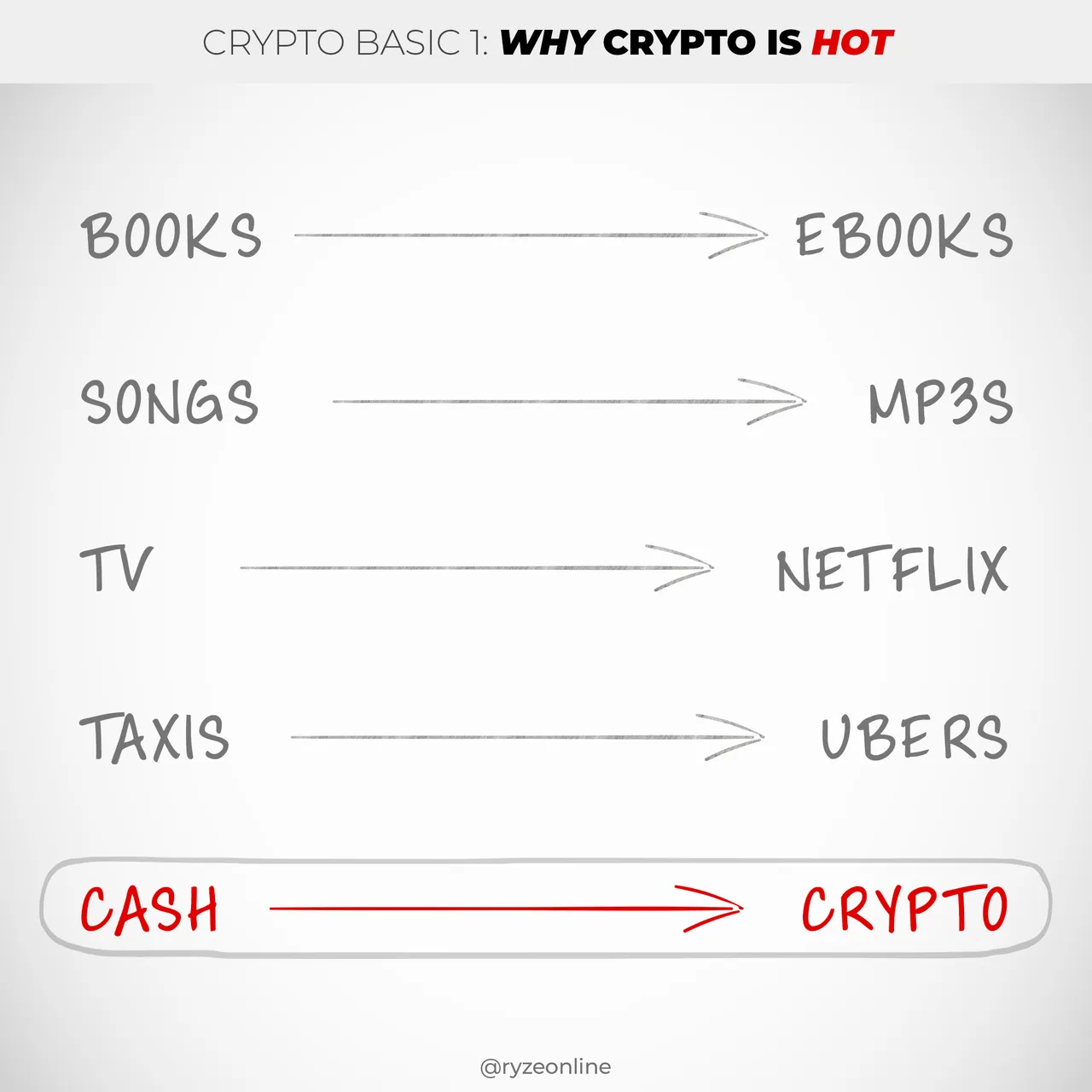
Fighting this evolution is as silly as fighting the switch from CDs to mp3s. It's probably smarter to get in as early as possible.
2. It's Really Just Currency.
Like many beginners, I talked to a few crypto-lovers in my circles. The result? Deer. In. Headlights. It felt like I was talking to a scientist. Or we were speaking different languages. It all sounded so insanely complicated. Turns out it isn't. 'Crypto' is short for 'cryptocurrency', and it really is just that, a currency. There are different kinds of currency in our world, and now, there are different kinds of digital currency too. And instead of being bundles of paper called "bills," they're bundles of digital code called "coins" (or "tokens"). Instead of trading goods & services for paper bills, we're now trading them for crypto tokens.
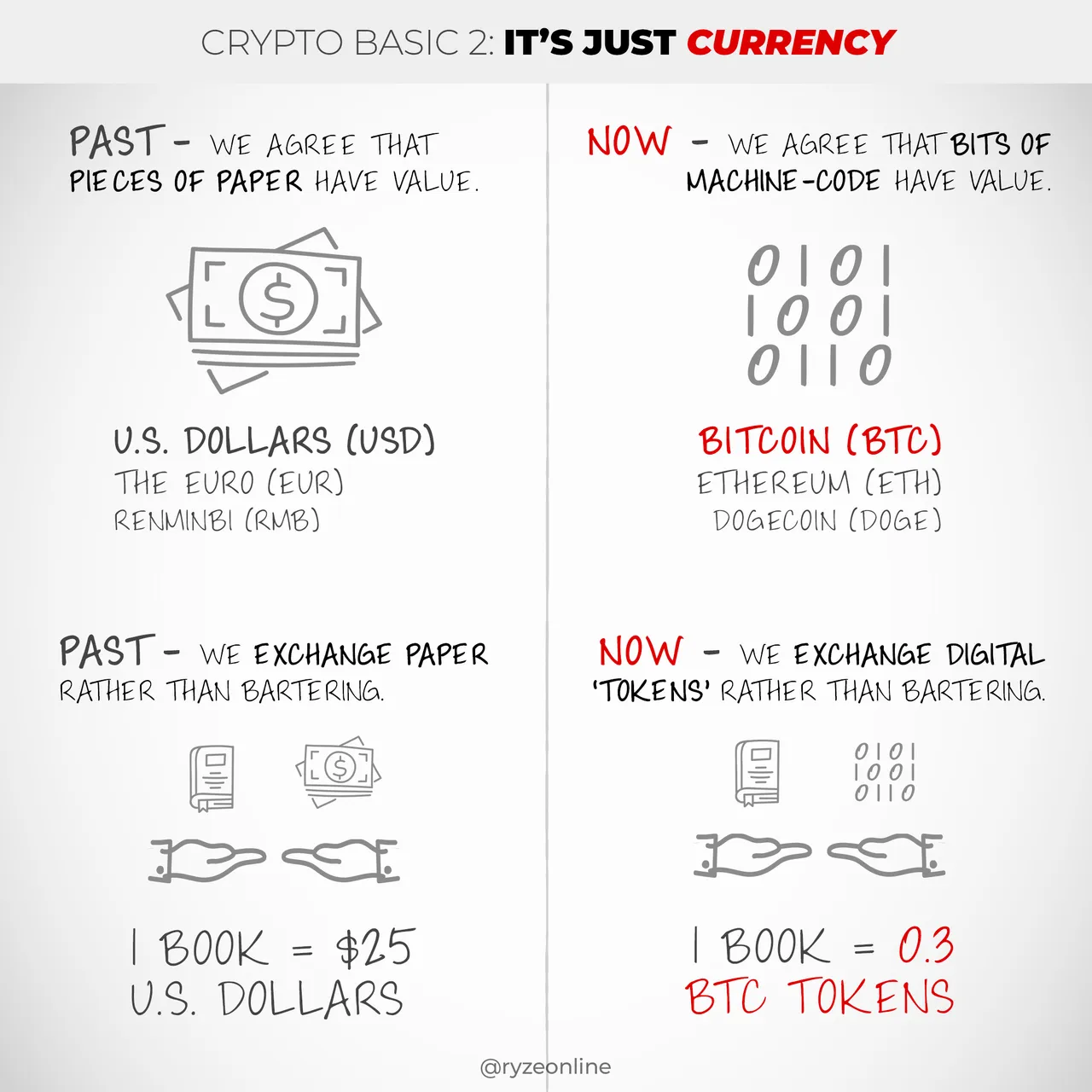
3. You'll Need A Digital Wallet
Where have people stored their money in the past? Banks, mainly. Crypto was born to ditch banks entirely. So everyone exchanging cryptocurrency requires a digital wallet. Your wallet will have a long wallet "Address." You can store Bitcoin in there, or Dogecoin, or Ethereum, etc. You can 'send' and 'receive' funds to and from your wallet. You can even have multiple wallets. Keep an eye out though, because crypto banks are rising up on the horizon. I believe there's at least one official one around already (anchorage.com).
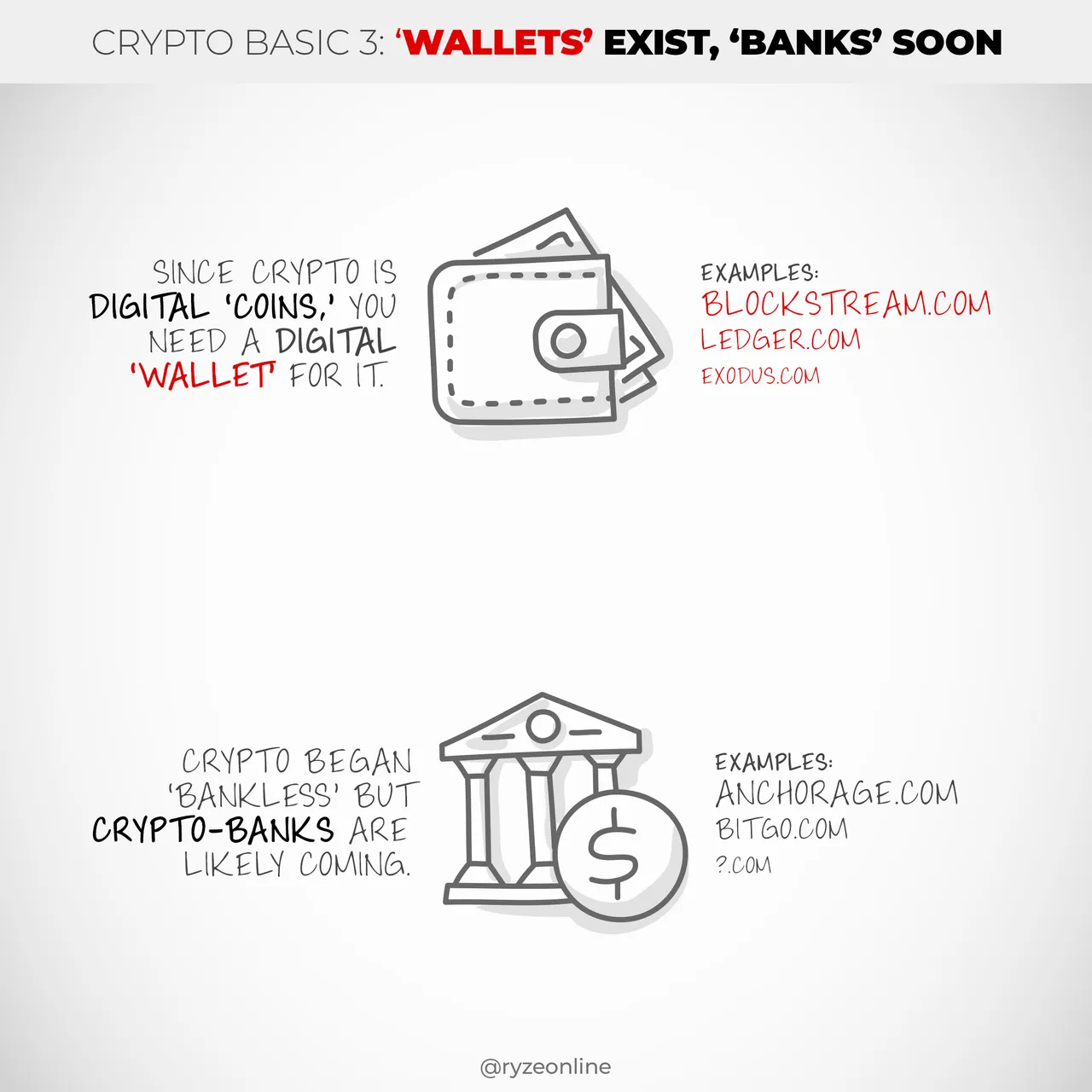
Your crypto wallet is like your bank account. And just like a bank account, your wallet has an 'account number' and a 'PIN number' (sort of). This makes it secure, but we'll get to that more in Basic #5.
4. K, But Where Do I Get Some Crypto?
The "market," basically. If you know about the stock market, you know it's basically an "exchange." It's where buyers and sellers go to exchange things. On the stock market, you can exchange foreign currencies. You can invest in the Euro, or the Dollar, or both. You can sell one and buy the other. You can trade one for another, right? Well, crypto is mainly bought and sold on crypto exchanges, such as CoinBase (or ShakePay for Canadians like me). Usually, you can signup for a free account at an exchange, and start buying or selling your first cryptocurrencies. (Bitcoin feels like the most stable beginner-buy to me, but some people are going nuts for doge at the time of writing.)
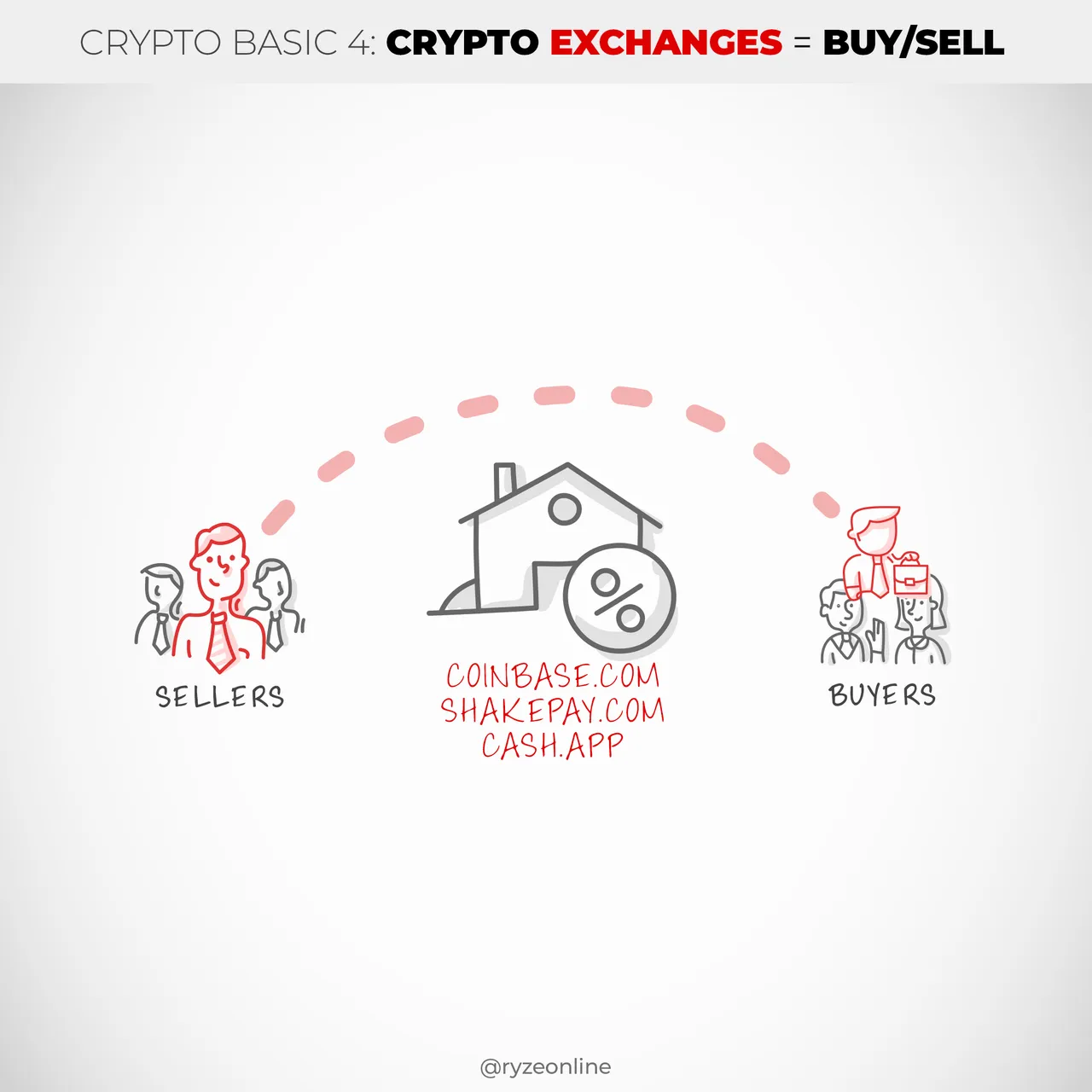
Exchanges aren't the only way to get crypto though. Just like in real life, one person can sell a certain currency to another, person to person (or peer-to-peer.) You can also locate a crypto ATM and buy some tokens with cash. Or even 'earn' crypto through contests and rewards programs held by some businesses.
5. Crypto Needs Keys.
It needs way too many keys, in my opinion, but they all have a purpose and ensure the security of your money and digital transactions. So... like... keys are good I guess. (Maybe you can tell that keys are my least favorite part of crypto.) I imagine any beginners who like easy-to-remember passwords will hate them, but they really are worth it, and make everything work.
As with banks, there are two parts to accessing your crypto. The public details (key) needed to receive money, and the private details (key) which you need to access your wallet (and send money.)
Public Key - Banks require an account # and transit code to receive funds. In crypto, this is called a 'public key'. It looks like a long sequence of numbers and letters. (It's also called an address or wallet address too.)
Private Key - This is like your PIN number (or signature on a credit card.) It's lets you access your crypto wallet. It lets you send & spend money. The private key is also a long sequence of numbers and letters. (Alternatively, some wallets may use a 'seed phrase' instead of a long, jumbled private key. This seed phrase is made up of many --12 or 24-- words instead.)
Note: Don't give your private key to anyone as this is like giving someone your PIN number!
Edit: The above section was partly written by @nickyhavey , and I appreciate the help.
Your wallet has a 'private key' and a 'public key.'
(Also called your 'key-pair.') They're both a crazy-long string of letters & numbers, and they're very important. Anyone who knows the private key can also figure out your public key. But you can give out your public key safely, and no one can reverse-engineer your secret private key.
It's like if someone has your PIN, they can use it and quickly find out your account #. But, you can safely give out your account #, and people can't use it to find out your PIN.
If you signed up for a traditional bank, you'd get an account # and a PIN. If you sign-up for a digital wallet, you get a Wallet Address & a Private Key... BUT they (confusingly) sometimes have different names.
It goes something like this: you create a new digital wallet at any digital wallet website. You're then given a key-pair. Your key pair is something like this:
Wallet Address (AKA Public Key): 1A1zp1eP5QGefi2DMPTfTL5Smv7D
Private Key (AKA Master Key): 2B3yf4tO7RHsdf3VBNYxWH4Qcz9A
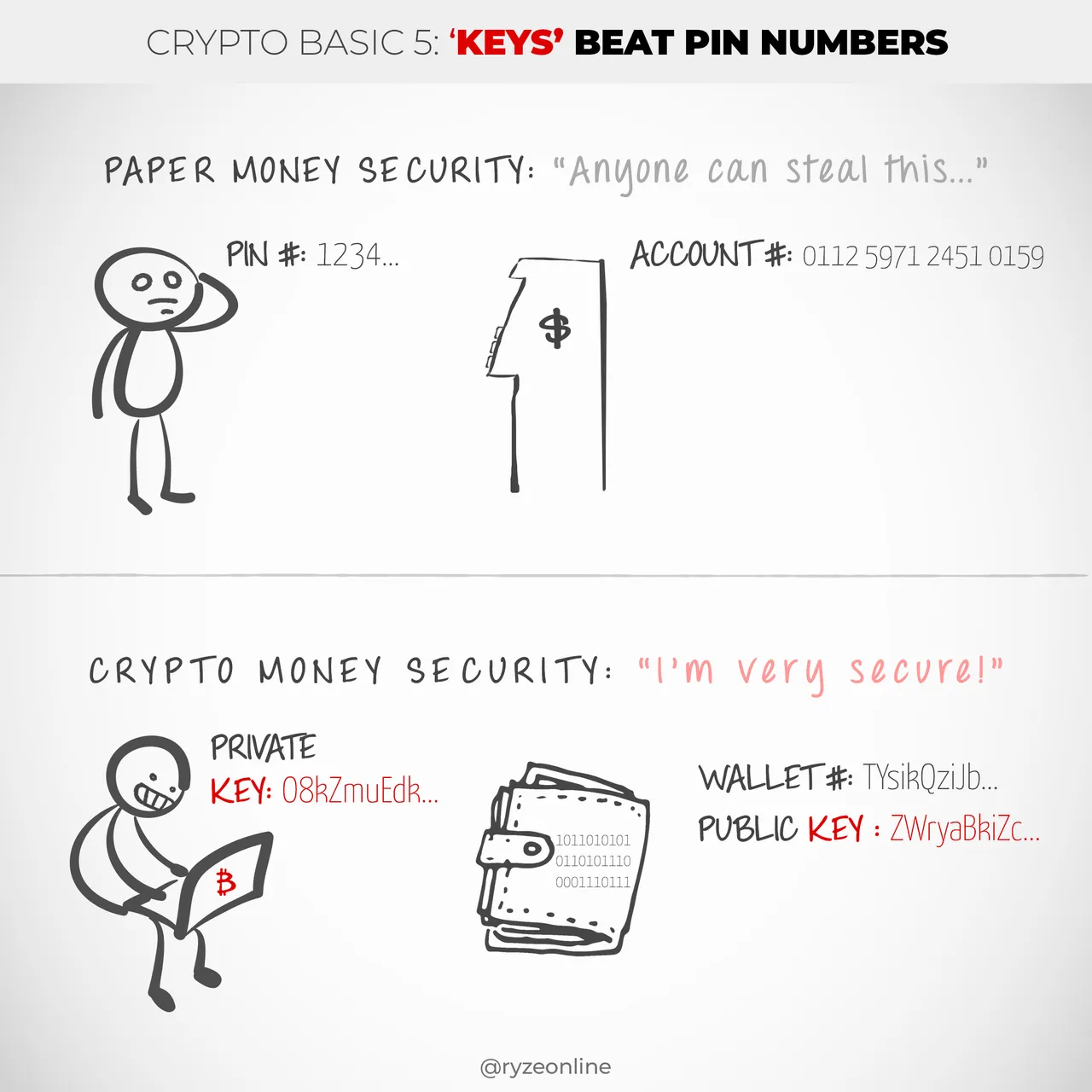
Now you have a new wallet ready to go. But no one knows it exists. Only when you do your first transaction, will the world know your wallet exists, and only then will someone be asking for your Wallet Address (Public Key), so they can transact with you. Your private key you'll keep to yourself like a PIN, your public key you'll give out for transactions, like an account number.
There's a lot more to keys, but I'll stop there.
Booyah! 5 crypto basics explained with friendly doodles.
("Please, oh great deity of the universe, let this be clear enough for beginners.")
So that's the cryptocurrency section. Now let's move on to the technology that makes crypto possible:
Blockchain Basics
A. What Is A "Blockchain?"
A blockchain is just a digital account book. It's a digital ledger that records transactions. Just like a bank keeps track of who's sending how much to whom, the blockchain keeps track of who's sending how much "data" to whom. It's basically a record book.
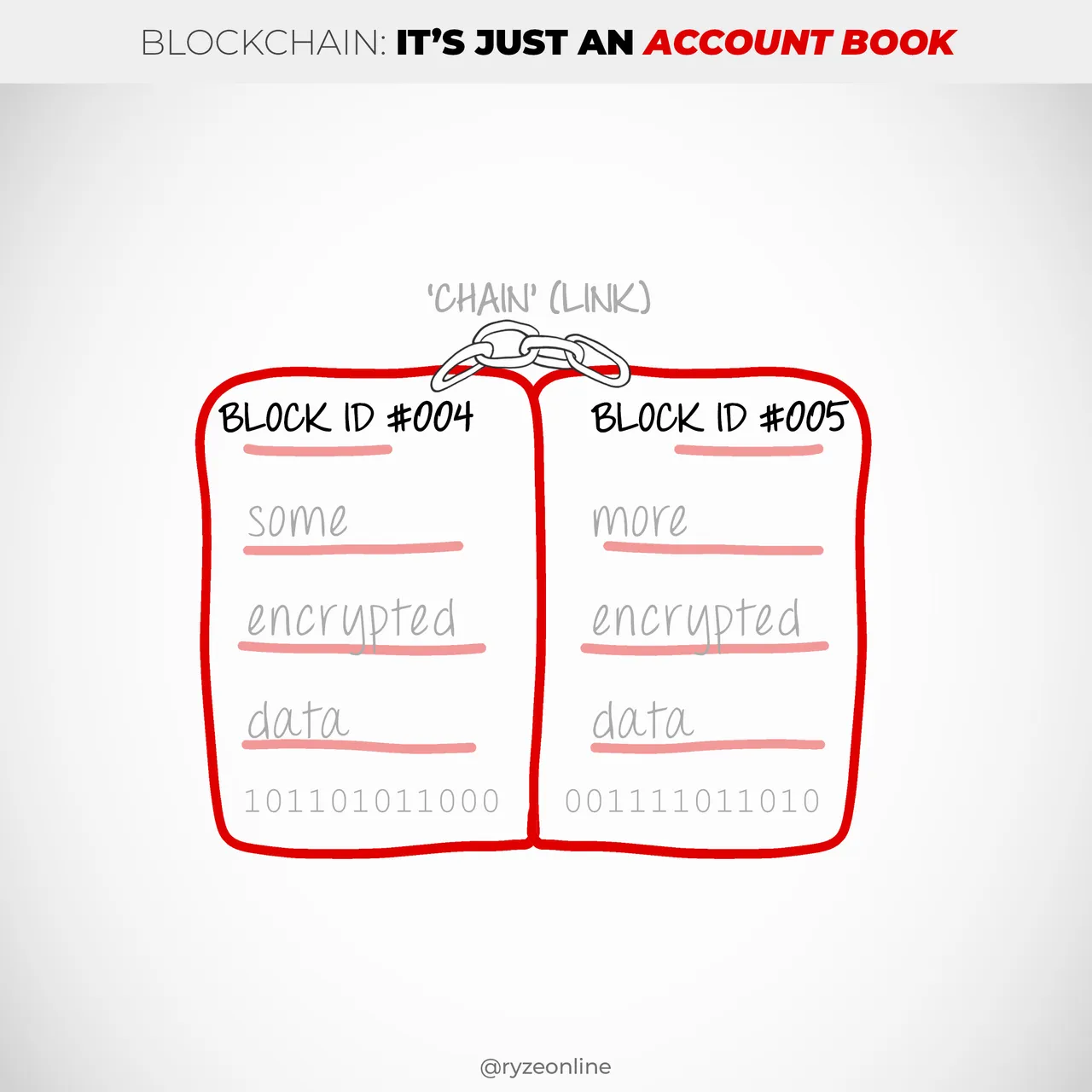
The reason people are so hyped about it is that people have tried to create digital money before and failed because they didn't have the "magic" encryption and security methods that the blockchain provides. So when blockchain technology debuted people realized that secure, trustworthy digital currency was possible. Awesome, right?
B. Blockchain isn't bitcoin, blockchain needs bitcoin.
Since the blockchain is a digital 'book' of transactions, it starts out empty. And it has no transactions to record unless people are exchanging things. So if no digital currencies existed, the blockchain would just sit there as empty, unused technology.
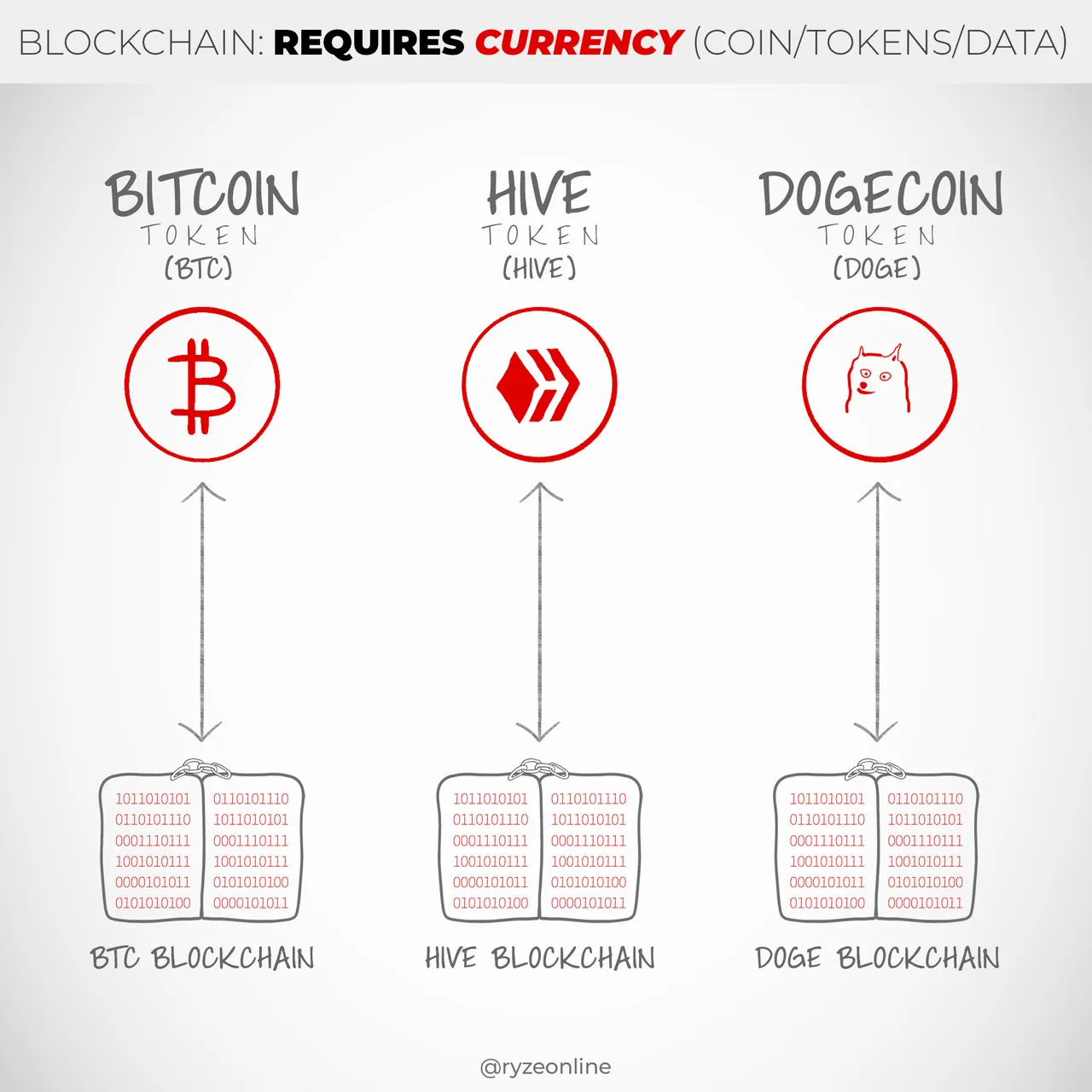
It's only when "coins" or "tokens" start being exchanged that blockchain had anything to do. When someone exchanges cryptocurrency (BTC, DOGE, HIVE, etc.), the blockchain records it. So the cryptocurrencies in your digital wallet aren't a blockchain. They're just tokens. Bits of data. And they must "move" to make the blockchain kick in and do its thing.
C. Blockchain Is Financial Transparency.
Unlike the records the bank keeps, blockchain is out in the open. The blockchain can be looked up by the public. There are fewer sneaky dealings and bankers holding all the power. Less moving money in the shadows. Blockchain record books are truly public. This is why the 'keys' are so, well, key.
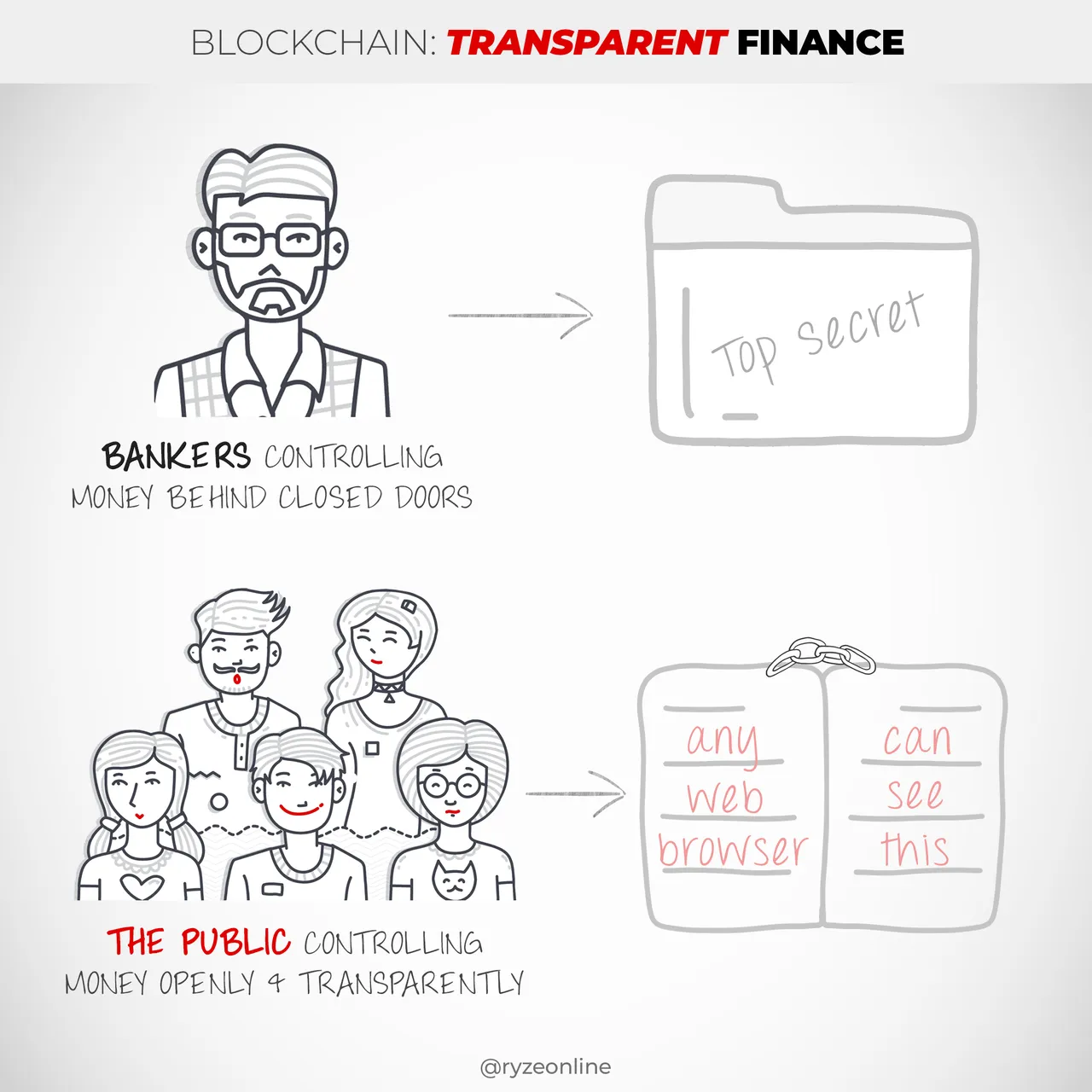
Nearly everything on the blockchain is heavily encrypted, so that people still have some privacy or semi-anonymity, even if every transaction is visible. We benefit from transparency and openness in the world's transactions.
D. Blockchain Tracks Digital Asset Trades.
Let's say you send 1 bitcoin to your friend Jane. Say you want one of Jane's (NFT) artworks in return. You both make the transaction, and the blockchain records it. Or say your friend Rob pesters you to sell him some dogecoin. He has ethereum. So you both enter the proper keys. Rob gets 2000 dogecoin for 1.5 of his ethereum. Another secure transaction, recorded by the blockchain.
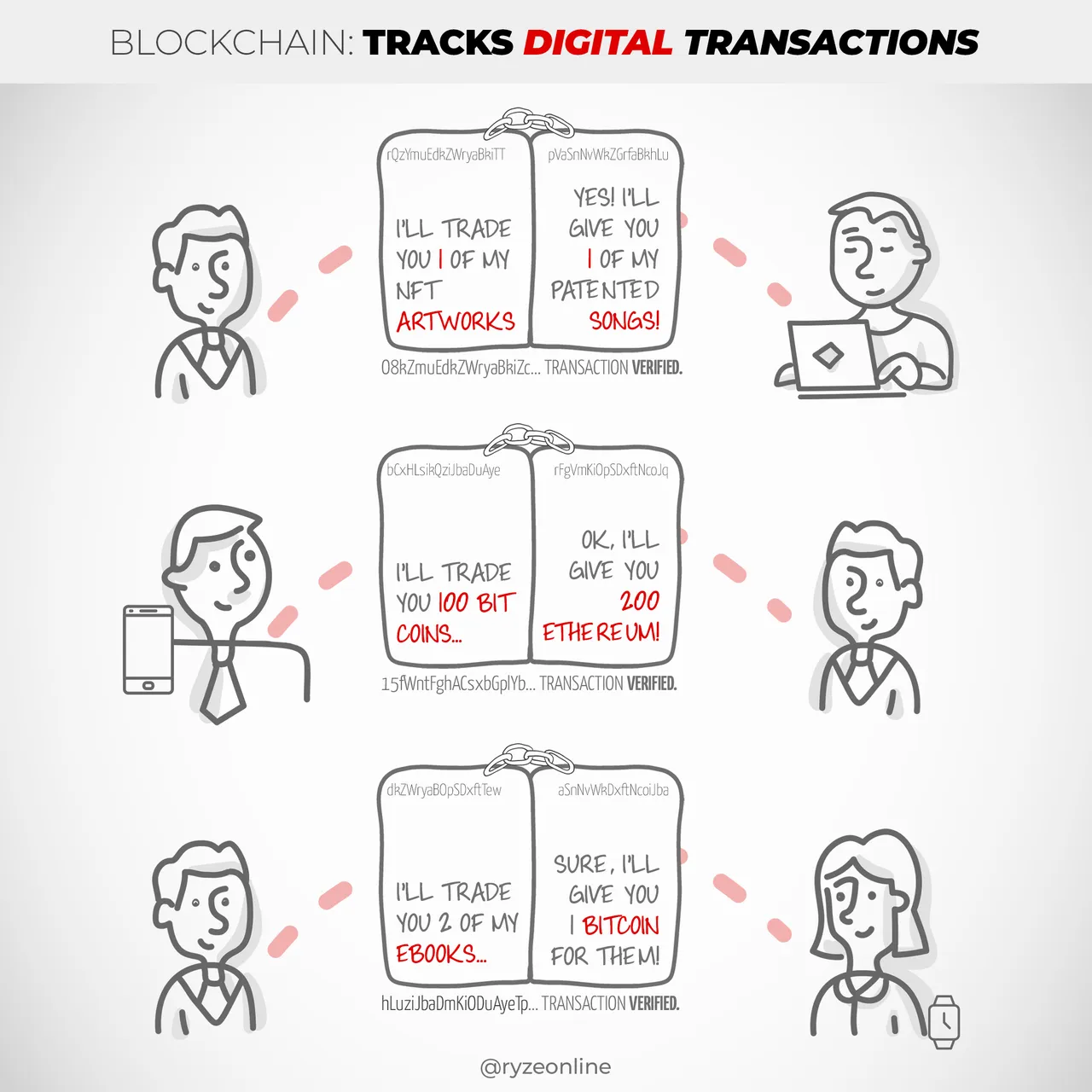
A blockchain does this for any transaction done on it.
Whew! That covers the basics of blockchain.
And let me point out again, that I'm a beginner. I'm a noob. I'm one week into Hive and Crypto. I bought my first 0.00019 of a bitcoin yesterday.
This means, that although I've done my best to research and understand, my information may be incomplete. This is all a complex new technology and my explanations may miss nuances or key details. I welcome (kind) corrections in the comments, but please be gentle. I'm a beginner, making tutorials for other beginners. If this is good enough, hopefully, others can link people to it to clear away some of the fog about crypto.
What About Hive Basics?
Well, I intend to cover the basics of Hive too, but this has gotten long enough. Plus, Hive is a 'different enough' animal that I see it deserving its own post.
**After reading, writing, and photoshopping all this, I feel better. I feel like my head's above water, and I can breathe. I might still be in the middle of a crypto-ocean, but at least I'm treading water. At least my vision is much clearer. Even if this only helps me, I can navigate decentralized media with more confidence than I did before I began.
I'd love if this boosted any other beginners' confidence too. And I'm almost certain I got something 'wrong' or missed an important nuance, but this post is still packed with value, IMO.
So if any hivians have anything to add in the comments, I'm sure it will help any beginners who stumble across this and make their onboarding process smoother and easier.
P.S. All these words & images were created by me (though I did get some of the doodles from Envato, a service I highly recommend to content creators who want to speed up their workflow.)
P.P.S. I'm pretty sure Hive etiquette says not to over-tag people, but I feel these basics are so important to Hive's growth, that I'm going to tag anyone I can think of who might be able to get this information out to beginners better than I can. I'm even tagging the 3speak guy, if he likes it maybe I'll make a video. Anyway, here goes...
Please help this post reach beginners: @lordbutterfly , @intothewild , @crosheille , @nickyhavey , @vikisecrets , @joshman , @meesterboom , @grindle , @karinxxl , @bil.prag , @anaclark , @traciyork , @theycallmedan , @saintchristopher , @cynshineonline . If people wanna not curate me, hate me, downvote me, or whatever, so be it. I know that tons of beginners will be flocking to crypto and hive, and we don't have time to educate them all by hand. These basics, even if they're slightly off base, will save everyone loads of time answering questions. It took me a ton of study, re-writes, and doodling to make. And I did all that with a good heart, aimed at helping Hive and the community overall. Hopefully, that spirit shines through.
Thanks for reading.
